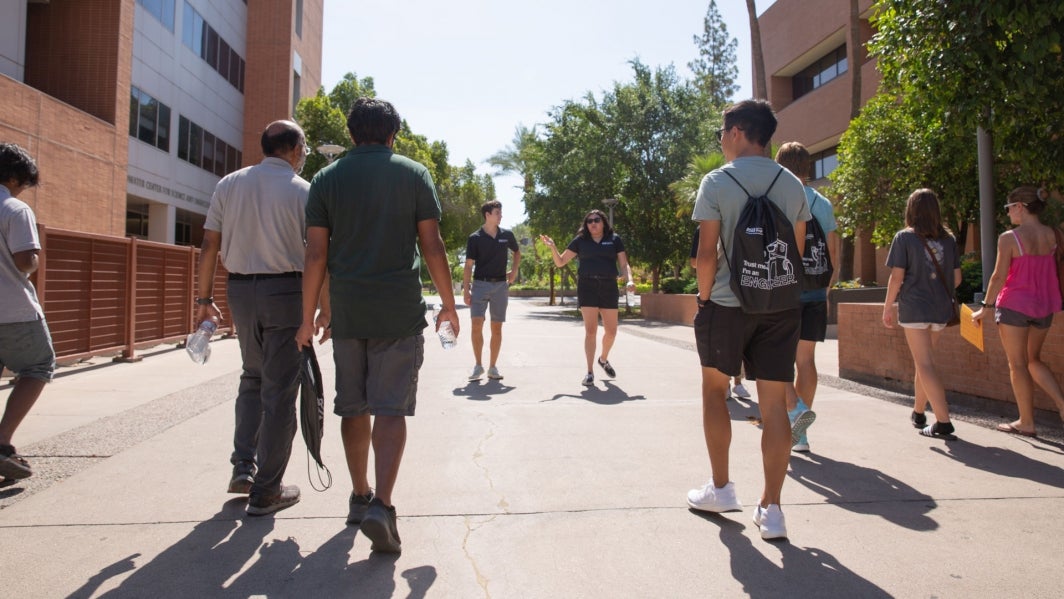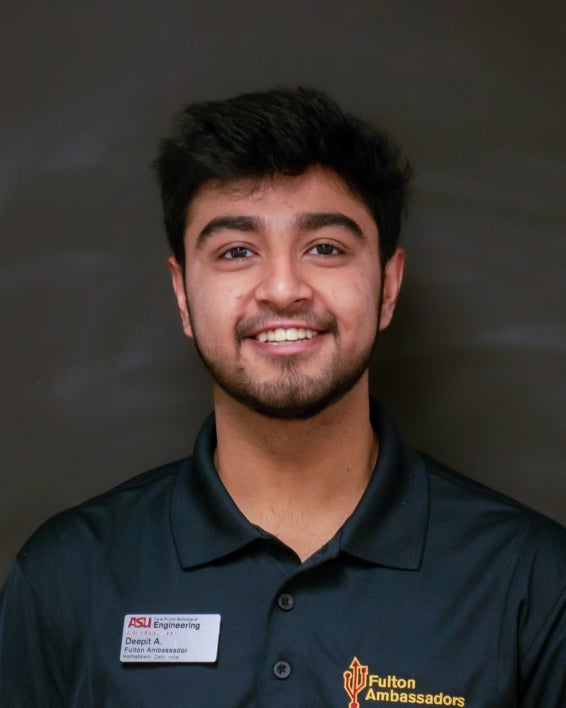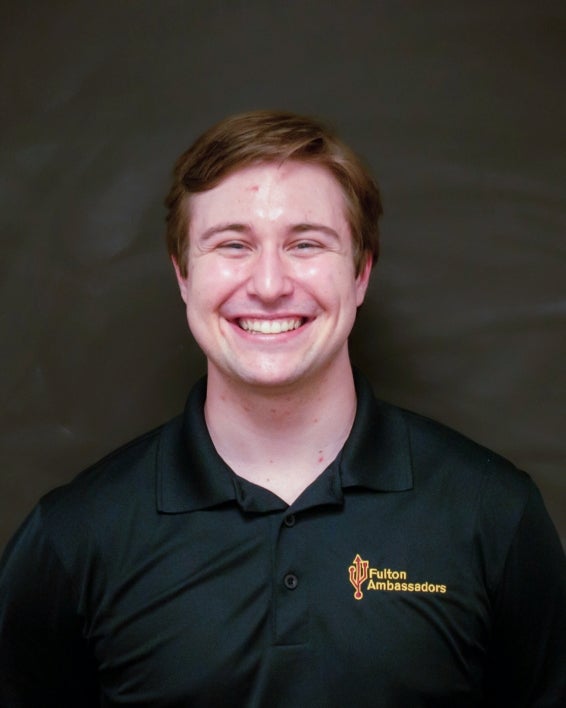An engineering student's personal guide to ASU

A Fulton Ambassador talks with a prospective student’s family during a tour of Arizona State University’s Tempe campus. Fulton Ambassadors are highly involved engineering students in the Ira A. Fulton Schools of Engineering who give tours, visit high schools and answer questions about life as an engineering student at ASU. Photo by Erika Gronek/ASU
When taking on an endeavor as challenging as pursuing an engineering degree, it’s good to know what you’re getting into. Prospective students considering the Ira A. Fulton Schools of Engineering at Arizona State University have access to the Fulton Ambassadors program, a student organization dedicated to giving a personalized, inside look into the life of an engineering student.
Whether they’re showing students and families around campus on tours, visiting local high schools or answering questions one-on-one, Fulton Ambassadors show prospective students what is possible by embodying the Fulton Difference — the Fulton Schools’ culture of building well-rounded engineers through experiential opportunities outside of the classroom.
The ambassadors continue to help students throughout their engineering journeys at ASU, serving as mentors and guiding their peers to resources to help them thrive.
“At the Fulton Schools, we believe it is important to get more than just a degree, and that is where the Fulton Ambassadors play a large role,” says Marilynn Aranda, advisor for Fulton Ambassadors and senior coordinator of Outreach and Student Recruitment at the Fulton Schools.
“This is a group of high-achieving students who are actively involved, which allows them to provide guidance and lead by example,” Aranda says. “It is inspiring to see the connections they create and how incoming students would like to follow in the same footsteps as our Fulton Ambassadors.”
Fulton Ambassadors have been serving as mentors for high school students preparing for the transition to college life since 2010. Over the years, the Fulton Ambassadors program has grown from 26 to more than 100 students and evolved to be fully student-led, with eight leaders coordinating the work of the organization’s members on two ASU campuses.
The program's prolific growth has been valuable in broadening the diversity of its members, which enables more prospective students to see themselves in the faces and experiences of current engineering majors.
“Becoming a mentor and a role model is about much more than an individual who is actively involved — it is an individual who can make strong connections with others in a unique way,” Aranda says. “It is great to see students from all backgrounds be a part of this organization.”
Participating in the volunteer program is an equally rewarding opportunity for the Fulton Ambassadors to grow and expand their own horizons in leadership and professional development.
We talked with Fulton Ambassadors student co-presidents Deepit Arora and Ian McDonald about what it’s like to be part of the program. Arora, the co-president for the ASU Polytechnic campus Fulton Ambassadors, is a junior majoring in engineering with a concentration in robotics. McDonald is the Tempe campus co-president and a mechanical engineering senior. Both have been Fulton Ambassadors for about two years and say their experience has resulted in connections and skills that will benefit them throughout their lives.
Two Fulton Ambassadors walk backward while giving a tour at ASU. In addition to the rewarding experiences of interacting with prospective students, Fulton Ambassadors gain leadership and professional development experience in this student-led organization. Photo by Erika Gronek/ASU
Did you get to interact with a Fulton Ambassador before you attended ASU?
Ian McDonald: I did have the opportunity to take a tour with a Fulton Ambassador while visiting the campus. This was a great opportunity for me to ask questions, see what the campus was like and delve into the mind of an engineering student. I got to hear about ASU’s amazing programs and how they shaped my tour guide’s experience as a student and future professional.
Deepit Arora: I never got a chance to meet a Fulton Ambassador when I was making my decision. I wish I knew about this program earlier. That way, I would have been able to meet with other students in my major, and that would have relieved some stress. I know from my interactions with prospective students that talking to another student in the same field helps them understand the program and make a well-informed decision.
Why did you want to be a Fulton Ambassador?
Deepit Arora
Arora: During my first semester, I was looking around to join organizations to work on my soft skills and build a professional network. I realized Fulton Ambassadors was a great place to do that. It provided me with multiple opportunities to develop my public speaking and leadership skills, connect with my peers and also help incoming students.
McDonald: Throughout high school and college, I have consistently tutored others, helped select schedules, researched schools and shared my experience as a tour guide. These previous experiences made me realize the positive impacts I could have on others by simply sharing my experiences and giving advice. Through guiding of the next generation of engineers, I am able to ensure that everyone has the equal opportunity to learn and thrive in any engineering field.
Why do you think Fulton Ambassadors are an important resource for prospective students?
Arora: Fulton Ambassadors play an essential role when it comes to talking with prospective students. We can do hundreds of presentations about our facilities and resources, but for a student, talking to someone who is currently using those facilities is very important. For a prospective student, hearing about a student’s experience makes a huge difference. They feel more connected. Plus, as students, we are more accessible and understand them better because we were in their shoes just a few years ago.
What are the typical questions you get asked by prospective students?
McDonald: The most common questions revolve around classes, class sizes, dining options, transportation, dorms and AP credit transfers. These kinds of questions allow me to tie in my research and personal navigation of ASU’s programs and pathways. Some of the anecdotes I like to share are really just about my experiences as a freshman, my passions, interests and best memories so they can see just how exciting college can be.
What's your favorite interaction with a prospective or incoming student?
Ian McDonald
McDonald: My most memorable interaction with a prospective student came from a summer camp I helped to run called the National Summer Transportation Institute, which exposes prospective students to ASU and engineering through field trips, activities and talking to the counselors at this overnight camp. Some of the campers in particular made it a point to come over to me during the breaks and hangout times to just ask about school and ask the exact same questions I had coming into college. Getting that one-on-one interaction, seeing that wonder and interest in engineering build over the course of a week was just super rewarding as a mentor and Fulton Ambassador.
Arora: One of my favorite interactions was a one-on-one session with a student from India. He had a very similar background to mine, and he wanted to study robotics as well. When we started talking, we realized that we both are from the same city and had very similar research interests. We talked for over an hour and didn’t even realize it. He joined the engineering program at The Polytechnic School and is now a good friend of mine.
How has the Fulton Ambassador experience helped you with your own student journey?
Arora: Throughout my time with Fulton Ambassadors, I have grown tremendously. Whether it be my public speaking skills or leadership and management skills, I have seen a huge change in how I carry myself. In addition, I find myself surrounded by a network of many top engineering students who are going to be great engineers for sure!
McDonald: Besides growing my personal network and communication skills, Fulton Ambassadors has given me a group that I feel closely models my own journey through school. Engineering is difficult, and it’s great hearing the experiences that others have and sharing in those late nights and spectacular opportunities. Bringing together some of the most talented and fun individuals in the Fulton Schools just makes for such a wonderful community to share the college experience with at the end of the day.
More Science and technology

ASU-led space telescope is ready to fly
The Star Planet Activity Research CubeSat, or SPARCS, a small space telescope that will monitor the flares and sunspot activity…

ASU at the heart of the state's revitalized microelectronics industry
A stronger local economy, more reliable technology, and a future where our computers and devices do the impossible: that’s the…

Breakthrough copper alloy achieves unprecedented high-temperature performance
A team of researchers from Arizona State University, the U.S. Army Research Laboratory, Lehigh University and Louisiana State…




